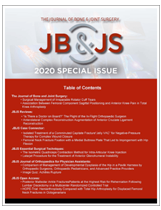


The Journal of Bone and Joint Surgery has long been committed to serving the orthopaedic community and enhancing patient care by publishing high-quality information. In John Reed’s “A Short History of the Journal,” written in 1961, he recounts how ever more of the “Editor’s time was devoted to urging and aiding authors to present their contributions in the most valuable form.” Thirty-three years later, JBJS Editor-in-Chief Henry Cowell, MD, echoed this sentiment when he announced that JBJS would begin blinding all peer review in order “to bring the best material to its readers and to elicit the best from its authors.” This decision to implement a rigorous double-blinded peer-review model, where reviewers and authors do not know each other’s identity, was made in response to author concerns about bias, and has helped ensure that reviewer assessments of manuscripts remain objective.
To date, JBJS, Inc. enlists the help of over 1,000 peer reviewers who review the content and methodology of submitted papers. For papers that require special attention to research methodology, Deputy Editors who are experts in methodology and statistics review preliminarily accepted manuscripts to assess the correctness of the methods used in the conduct of the study. In this way, readers can be certain that the conclusions of the study do not exceed the limits of the study design.
The peer-review process is further supported by a board of Associate Editors who are selected on the basis of their interest and skill in the peer-review process, the majority of whom also participate in the JBJS Elite Reviewers program. Elite Reviewers are JBJS’s top-performing reviewers—whose eligibility is based on the quality of their feedback and timeliness of review—and are rewarded for their outstanding contributions with a number of benefits, including free CME credits for reviews and a letter of recognition from the Editor-in-Chief.
Thus manuscripts submitted to JBJS receive feedback from a team of reviewers who are experts in their fields and skilled in providing feedback, with reviews by:
Authors report that this process, allowing them to respond to comments and questions at each stage, vastly improves their articles. At JBJS, maintaining standards of excellence for every article means continued dedication to peer review.
Click here for more information about JBJS peer review.
*A small proportion of JBJS submissions are rejected by the Deputy Editor without being sent for additional external review (although the Deputy Editor and Editor-in-Chief always offer a few suggestions for improvement). This allows the author to receive this decision quickly and submit the article elsewhere.

Sign up to receive your free JBJS 2020 Special Issue—a compilation of the most-read articles. You get twelve articles across six JBJS publications in this special issue.